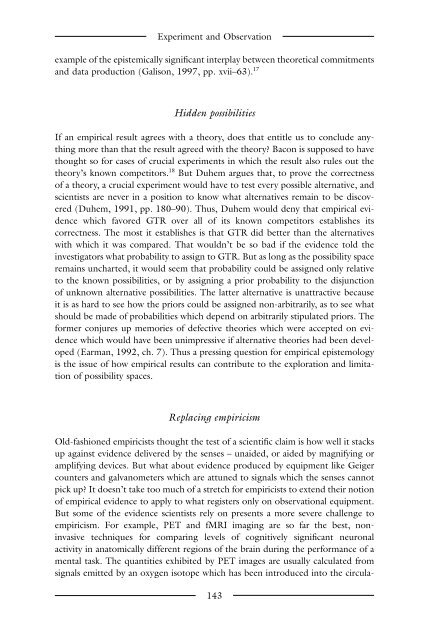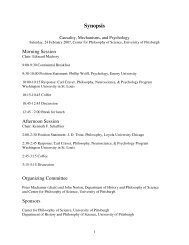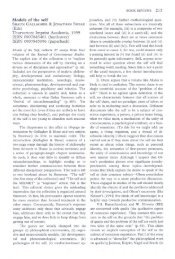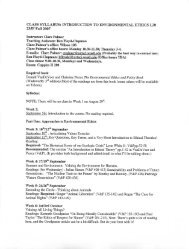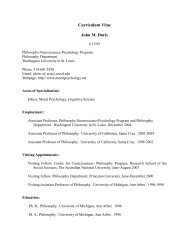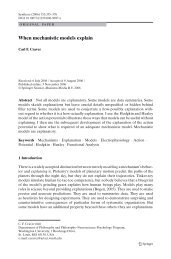The Blackwell Guide to the Philosophy of Science - The Department ...
The Blackwell Guide to the Philosophy of Science - The Department ...
The Blackwell Guide to the Philosophy of Science - The Department ...
You also want an ePaper? Increase the reach of your titles
YUMPU automatically turns print PDFs into web optimized ePapers that Google loves.
Experiment and Observation<br />
example <strong>of</strong> <strong>the</strong> epistemically significant interplay between <strong>the</strong>oretical commitments<br />
and data production (Galison, 1997, pp. xvii–63). 17<br />
Hidden possibilities<br />
If an empirical result agrees with a <strong>the</strong>ory, does that entitle us <strong>to</strong> conclude anything<br />
more than that <strong>the</strong> result agreed with <strong>the</strong> <strong>the</strong>ory? Bacon is supposed <strong>to</strong> have<br />
thought so for cases <strong>of</strong> crucial experiments in which <strong>the</strong> result also rules out <strong>the</strong><br />
<strong>the</strong>ory’s known competi<strong>to</strong>rs. 18 But Duhem argues that, <strong>to</strong> prove <strong>the</strong> correctness<br />
<strong>of</strong> a <strong>the</strong>ory, a crucial experiment would have <strong>to</strong> test every possible alternative, and<br />
scientists are never in a position <strong>to</strong> know what alternatives remain <strong>to</strong> be discovered<br />
(Duhem, 1991, pp. 180–90). Thus, Duhem would deny that empirical evidence<br />
which favored GTR over all <strong>of</strong> its known competi<strong>to</strong>rs establishes its<br />
correctness. <strong>The</strong> most it establishes is that GTR did better than <strong>the</strong> alternatives<br />
with which it was compared. That wouldn’t be so bad if <strong>the</strong> evidence <strong>to</strong>ld <strong>the</strong><br />
investiga<strong>to</strong>rs what probability <strong>to</strong> assign <strong>to</strong> GTR. But as long as <strong>the</strong> possibility space<br />
remains uncharted, it would seem that probability could be assigned only relative<br />
<strong>to</strong> <strong>the</strong> known possibilities, or by assigning a prior probability <strong>to</strong> <strong>the</strong> disjunction<br />
<strong>of</strong> unknown alternative possibilities. <strong>The</strong> latter alternative is unattractive because<br />
it is as hard <strong>to</strong> see how <strong>the</strong> priors could be assigned non-arbitrarily, as <strong>to</strong> see what<br />
should be made <strong>of</strong> probabilities which depend on arbitrarily stipulated priors. <strong>The</strong><br />
former conjures up memories <strong>of</strong> defective <strong>the</strong>ories which were accepted on evidence<br />
which would have been unimpressive if alternative <strong>the</strong>ories had been developed<br />
(Earman, 1992, ch. 7). Thus a pressing question for empirical epistemology<br />
is <strong>the</strong> issue <strong>of</strong> how empirical results can contribute <strong>to</strong> <strong>the</strong> exploration and limitation<br />
<strong>of</strong> possibility spaces.<br />
Replacing empiricism<br />
Old-fashioned empiricists thought <strong>the</strong> test <strong>of</strong> a scientific claim is how well it stacks<br />
up against evidence delivered by <strong>the</strong> senses – unaided, or aided by magnifying or<br />
amplifying devices. But what about evidence produced by equipment like Geiger<br />
counters and galvanometers which are attuned <strong>to</strong> signals which <strong>the</strong> senses cannot<br />
pick up? It doesn’t take <strong>to</strong>o much <strong>of</strong> a stretch for empiricists <strong>to</strong> extend <strong>the</strong>ir notion<br />
<strong>of</strong> empirical evidence <strong>to</strong> apply <strong>to</strong> what registers only on observational equipment.<br />
But some <strong>of</strong> <strong>the</strong> evidence scientists rely on presents a more severe challenge <strong>to</strong><br />
empiricism. For example, PET and fMRI imaging are so far <strong>the</strong> best, noninvasive<br />
techniques for comparing levels <strong>of</strong> cognitively significant neuronal<br />
activity in ana<strong>to</strong>mically different regions <strong>of</strong> <strong>the</strong> brain during <strong>the</strong> performance <strong>of</strong> a<br />
mental task. <strong>The</strong> quantities exhibited by PET images are usually calculated from<br />
signals emitted by an oxygen iso<strong>to</strong>pe which has been introduced in<strong>to</strong> <strong>the</strong> circula-<br />
143


